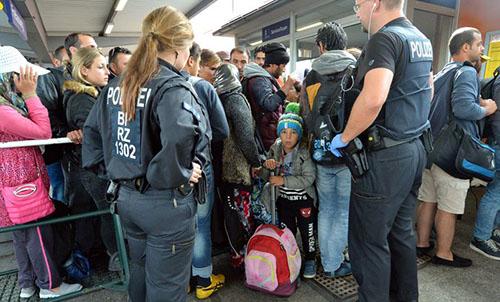Austrian government moves to tighten asylum rules
Austria's government, facing a record influx of migrants as well as a surge in support for the anti-immigration far-right, moved Tuesday to tighten asylum rules in the EU country.
According to a contentious bill, those granted asylum will be reassessed after three years. If their countries of origin are then deemed to be safe, they will be sent back.
Those under "subsidiary protection" -- a kind of asylum-lite status awarded in particular to Afghans -- will meanwhile only be allowed to be joined by family members after three years, up from one year now.
Chancellor Werner Faymann said that the legislation, due to go before parliament in December, is a "signal that asylum is something which is temporary" aimed at deterring people from coming to Austria.
Rights groups sharply criticised the proposals, saying they would make the integration of migrants into Austrian society more difficult.
The UN refugee agency, the UNHCR, said tightening rules on relatives coming to Austria "could keep families apart for many years, if not for ever."
Austria has seen some 400,000 migrants enter the country since September, most of whom travel onwards to Germany or Scandinavia.
But the government still expects some 85,000 asylum claims this year, making the Alpine country of 8.5 million people one of the highest recipients in Europe on a per-capita basis.
Meanwhile, the Greek government said the European Union on Wednesday will launch its programme to relocate refugees from Greece to other member states in its bid to ease internal strains in the migrant crisis.
Prime Minister Alexis Tsipras will meet a first group of 30 refugees at Athens airport before they voluntarily board a plane for Luxembourg, the government said in a statement.
The European commissioner for immigration, Dimitris Avramopoulos of Greece, as well as European Parliament president Martin Schulz and Luxembourg Foreign Minister Jean Asselborn will attend the launch of the programme, an EU statement said.
Laboriously devised and, in some quarters, fiercely contested, the EU plan calls for sharing out nearly 160,000 migrants among EU countries after they are processed at so-called "hotspots" in Italy and Greece.
They include 66,000 for whom Greece was the first port of call. The first asylum-seekers left Italy under the relocation plan on September 9.
More than 200,000 migrants arrived in Greece in October alone, according to the UN refugee agency, though many have moved on to other EU states.
Some EU member states such as the Czech Republic, Hungary, Slovakia and Poland oppose the mandatory quota plan for refugee relocation.
A group of conservatives parties from across Europe met last month in Madrid and called for a strengthening of the union's external borders.
Caption: Refugees wait for a train at the rail station in Freilassing, southern Germany near the Austrian border.
Photo Credit: www.sandiegouniontribune.com
Related Posts

